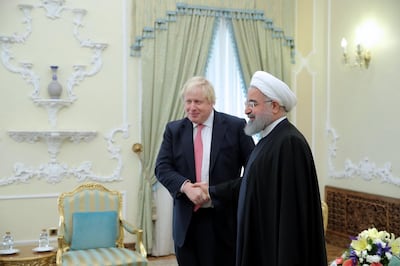Nazanin Zaghari-Ratcliffe, a British-Iranian mother who has been jailed in Iran for nearly two years, is "eligible for early release".
It is understood that Mrs Zaghari-Ratcliffe was informed of the news by her Iranian lawyer, who saw the change in her status on the Iranian judiciary database. It was previously classed as "closed".
Mrs Zaghari-Ratcliffe was arrested in Tehran in April 2016 while travelling there with her toddler daughter, Gabriella.
Accused of plotting the "soft toppling" of Iran's government, she was sentenced to five years in prison.
But her lawyer now believes she could be home "within a couple of weeks", according to Mrs Zaghari-Ratcliffe's husband.
Richard Ratcliffe, who has been calling on Iran to release his wife before Christmas, told The Independent: "It's not the same as a decision having been made to release, but it is a very clear positive sign towards that.
“The lawyer also said ‘I think they are just going to finalise the paperwork.'
"It doesn’t mean she is going to be out tomorrow. His [the lawyer's] estimate was within a couple of weeks.”
He added: “It is definitely positive. It’s hard to know how positive, but for me, it’s now a question of when not if.”
Tulip Siddiq, Mrs Zaghari-Ratcliffe's local Member of Parliament, added that the news was "a glimmer of light at the end of a dark tunnel for my constituents Richard, Nazanin and Gabriella".
"It has given Nazanin a real boost of positive energy, and now we wait impatiently to see what happens next.
"Although we do not want to celebrate prematurely, it would be the perfect Christmas gift to see Nazanin released and back with her family where she belongs.”
_______________
Read more:
Boris Johnson hints at progress over jailed Nazanin Zaghari-Ratcliffe after visiting Iran
Boris Johnson holds ‘frank’ talks with Iran minister about jailed British mother
_______________
Britain’s Foreign Secretary Boris Johnson met with President Hassan Rouhani and other Iranian officials in Tehran earlier this month to discuss the case of Mrs Zaghari-Ratcliffe and other jailed dual nationals.
Speaking to the House of Commons on his return, Mr Johnson said his trip had been “worthwhile”, adding that his government would “leave no stone unturned” to secure the release of British nationals jailed in the country.
"I urged their release, on humanitarian grounds, where there is cause to do so," Mr Johnson told the British parliament.
Last month, Mr Johnson mistakenly claimed the 39-year-old had been training journalists in the country, something her employers, the Thomson Reuters Foundation, and her family have strongly denied. Mr Johnson later retracted the comment and apologised.
Mr Johnson’s mistake led to calls for him to resign should Mrs Zaghari-Ratcliffe’s sentence be extended because of his remark.
However, the Foreign Secretary went some way towards redeeming himself with his diplomatic efforts in Tehran, which resulted in Mrs Zaghari-Ratcliffe's latest court hearing being postponed.
The decision to delay the hearing - in which she had been expected to have her jail sentence extended - was welcomed by the family and campaigners.
An online petition for her release has collected almost 1.5 million signatures.

A number of dual nationals and expatriates have been detained indefinitely in Iran on similar charges as those made against Mrs Zaghari-Ratcliffe.
One of them, Ahmad Reza Jalali, has been in jail since April 2016 on allegations of aiding Israel in assassinating Iranian nuclear scientists. On Sunday, Iran state TV aired a report in which the Sweden-based Iranian national purportedly "confessed" to spying.
Other dual citizens who have been released from prison in Iran under the early release scheme have been forced to remain in the country for the duration of their sentence.
British-Iranian Roya Nobakht, who was arrested and imprisoned in 2013 after posting anti-regime comments on Facebook, was released in 2017 under the early release scheme but must remain with her family in Iran until the end of her seven-year term.
With this in mind, Amnesty urged caution about Thursday's news on Mrs Zaghari-Ratcliffe, saying: “As far as we’re concerned, this won’t end until Nazanin and Gabriella are actually on a plane and heading back to London."
In a statement, Amnesty International UK’s Individuals At Risk Campaigner, Kathy Voss, said: “There have already been many ups and downs in Nazanin’s case, so we have to be cautious about any premature celebrations."
She added that Mrs Zaghari-Ratcliffe should not have been put in prison in the first place, but she welcomed the news about her eligibility for early release as “a sign that Nazanin’s ordeal may be coming to an end”.

